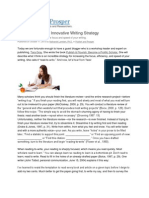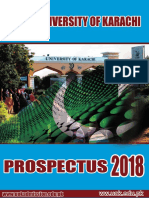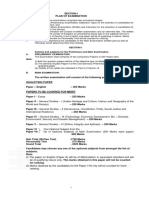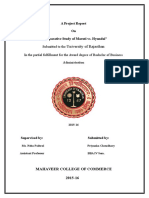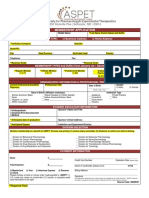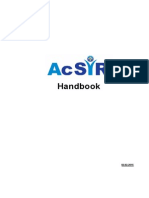PHD Transcript
Uploaded by
Shubhangi GargPHD Transcript
Uploaded by
Shubhangi GargPh.D Proposal and Research Management : Ph.
D Proposal and Research Management Doctoral Workshop At the 1st International Congress on Pervasive Computing IHC, New Delhi, India On 13 December 2008 Benefits : Writing a proposal is an obvious and essential first step in any significant primary research. It has at least two benefits. It requires you to think up and think through a research (able) problem, clearly and concretely. It also forces you to try to persuade knowledgeable others of the problem's merits and your qualifications. It is thus an excellent means for coming to terms with a nebulous set of issues. Proposals are probably the most rewritten and scrutinized prose that any of you will write. There are various formats, but it is usually best to craft your basic proposal in about ten pages (2500-3000 words). The most widely accepted framework has four sections, which are described below: Benefits Guidelines for a Ph.D. proposal : Guidelines for a Ph.D. proposal Topic : Topic Provide a title preferably with a sub-heading A PhD study must make a substantial and original contribution to scholarship, for example through the discovery of knowledge, the formulation of theories or the innovative re-interpretation of known data and established ideas. In what way is the proposed study expected to fulfil this requirement? If the proposed study includes a creative component, describe the creative component and show in what way the thesis and creative components may be linked. The research topic should have been defined to the mutual satisfaction of the candidate and the supervisors. The specific aims of the project-the problems it hopes to solve or particular questions it will answer. The methods to be used or the approach to be taken. What similar projects have been undertaken here or elsewhere, have similar methods been used before? Formulation of Topic : Formulation of Topic The need is to formulate a topic in such a manner that a researcher could investigate some specific aspects, dimensions, problems and come out with some tangible findings, conclusions, theories etc. in his/her investigation. Significance and Relevance of Research on the Topic concerned: Here it should be shown how the investigation on the particular topic would be relevant and significant for the advancement of knowledge, or original ideas in the field concerned. The Social relevance (wherever possible) or significance of the possible findings can also be mentioned. Doctoral Research : Doctoral Research Short term research projects, such as those undertaken in Honours or Postgraduate Diplomas, are essential training for graduate researchers. The transition into a graduate research degree involves a much higher level of independent thinking, planning and activity than most students expect. Most students find the transition both challenging and exciting; some find it daunting, even when they have performed well in Honours. A graduate research degree provides a unique opportunity to follow your interest in an area of research, to focus on this for several years and make an important contribution to the development of your chosen research area. The focus is on your capacity for innovative, independent research, critical thinking, time and project management and problem solving. You will also need to have, or to develop, excellent skills of organisation and communication of information. Certain details : Certain details What efforts have been made to ensure that the project does not duplicate work already done? Identify some leading scholars in the field, particularly some whose published work you have had occasion to study. Candidates should show familiarity with the literature in the field. In addition to confirming that proper supervision is available for the project, please comment on any other requirements, for example: Special Equipment, Special Techniques, Special Literature, Statistical Advice. What funds will the School commit to maintain the Project? Each candidate must have a supervisor who is nominated as the Coordinating supervisor. The Coordinating supervisor is responsible for ensuring that the administrative and reporting requirements of the supervisors are met. The Thesis : The Thesis A. The objective. : A. The objective. The proposal should open with a brief statement that declares in general terms the principal aim of your research. It should also suggest (briefly) the significance of the question. Get to the point quickly. Within a half page of text, the reader/reviewer must know your basic question and why it might be important. This section is usually the last to be written. B. The background. : B. The background. This section is a short bibliographic essay that answers the question, what is the scholarship that is relevant to this research project and that has inspired you? You may organize your review around works or
debates or scholars which/who have contributed theoretically to your chosen topic. Avoid a simple recitation of references. Introduce the literature judiciously, and do not run off a laundry list of names. Avoid sheer negativity. It is unlikely that any project is so thoroughly novel as to pull the scales from our eyes and correct all previous ignorance and errors. The reviewer wants to know how you fit in as well as how you stand out. You can usually see further by standing on the shoulders and not in the ashes of those who have come before you. In short, organize your commentary in this section to make your project appear as the next logical, necessary step in our understanding of an issue. C. The research design. : C. The research design. How will you operationalize your general problem and how will the research proceed? What particular questions and methods do you plan to use? What is your rough timetable? What difficulties do you anticipate? How will you handle ethical dimensions of the project? It is usually at least as long as the previous section. Most reviewers, are not overly concerned with whether you will follow this design in all its details. Contd./ : Contd./ Rather, they read this section as a test of whether you can translate an abstract question into an actual research program that is feasible, realistic, and imaginative. You must walk a delicate line between claims that are too cautious (and hence, uninteresting) and those that are overly ambitious (and thus not credible). This section should include (usually at the end) a brief account of any preliminary research you have done towards the project and other credentials (contacts, language and other skills) that strengthen the likelihood of success. D. The significance. : D. The significance. Why should anybody fund you? What does the project promise to contribute to our understanding? This section, in effect, makes explicit the connections between the previous three sections. Be specific. Reviewers (who are likely senior and more experienced than you) are seldom impressed with hot air ("this project will present an entirely new understanding of ") or with broken walls of knowledge ("this project will fill a gap in our understanding of."). The challenge is to express your project's importance in a way that is neither vain boasting nor underwhelming modesty. Literature Survey : Literature Survey Scholar with the help of the supervisor concerned should give a broad account of the work that has already been carried out on the topic or related aspects of the topic concerned. It is important that a scholar should have a more or less clear picture before he/she embarks on his/her research venture in the relevant area or study. The extent to which the problem has already been studies, the aspects that remain unexplored so far, broad findings in the area etc. should be kept in view. In his/her synopsis a scholar should point out the aspects of the concerned topic which need to be further investigated. It may also be pointed out the conclusions arrived at many a time are either inadequate or difficult for him/her to agree with. Hence, he/she should also explore the possibilities of arriving at alternative conclusions or for giving new interpretations etc. Scope of Research: : Scope of Research: Having dwelt on the relevance and extent of the existing studies on or around the proposed topic, a scholar should explain the scope, possibilities and potentials in terms of findings that his research work might offer. It is possible that one may have a very tentative view in this regard. It could also happen that in the process of research work the initial views of the scholar might change substantially. However, it is imperative that one should start with clarity about what one would be dealing with. The main aim of research work lies in the fact that in the process of investigative exploration one should develop as a scholar equipped with the necessary analytical faculties and methodological skills which should help him/her in future research endeavors. Chapterisation : Chapterisation It is essential that Chapterisation should be done on more scientific basis and one chapter should naturally flow from the other so that there is a continuity of thought and concepts. The content of each chapter should be elaborated in brief with a view to facilitate the Research Board to understand clearly the various aspects of research proposals. Similarly, conclusion/s should not be simply a summary but should bring out the salient features of the thesis. Bibliography: : Bibliography: A synopsis should also include a bibliography incorporating major works relevant to the area of study. However, bibliographical data should be presented in the format that is usually followed in research works of the discipline of the world over. Some Examples are given below: Slide 18: Bhanu Murthy., K.V. (1995). Manpower development - Skills, technology and basic science. Paper in Delhi University Seminar on `Role of the university in manpower development for industry ', Aakriti, New Delhi, pp. 4750. Buzzell, C.H. (1987). Let Our Image Reflect Our Pride. Vocational Education Journal V.62, no. 8 NovemberDecember. Florida., R. (1999). Industrializing Knowledge: University-Industry Linkages in Japan and the United States (MIT Press, 1999) Hammer., M. & James Champy (1993). Re-engineering the Corporation. Harper
Business. Henry., Charles (2008). Can Universities Dream of Electric Sheepskin?: Systemic Transformations in Higher Education Organizational Models. Ann Arbor, MI: Scholarly Publishing Office, University of Michigan, University Library, vol. 11, no. 1, Winter. Hilton., James (2004). Role of the University in Knowledge Economy. Presentation at SAC Conference. http://connect.educause.edu/Library/Abstract/TheRoleoftheUniversityint/43102?time=1223297362 Newman, John Henry (1852). The Idea of a University Defined and Illustrated: I. Edited with introduction and notes by I.T. Ker. Oxford: Clarendon Press, 1976. Supervisor : Supervisor Generally, allocation of supervisors is a matter for individual negotiation between student and supervisor, and students are free to choose. You should make your choice with great care, as the effectiveness of the student/supervisor relationship has a major effect on your experience. The role of supervisors is to advise, guide and provide constructive feedback to you through the processes of choosing a realistic topic, designing a viable project, doing the research and interpreting the findings and writing the dissertation. Role of Supervisor : Role of Supervisor Your and your supervisors preferred styles of supervision. How you and your supervisors will resolve issues of intellectual property, authorship of publications and so on. The regularity, timing and format of your meetings; The type and level of assistance you would like, and your supervisors are prepared to give, with respect to: Choosing a topic and refining the project; Planning a schedule; setting goals; Finding appropriate literature; Collecting the data and information; Analysing and interpreting your findings; Planning the dissertation; and writing and reviewing the dissertation; A schedule for the research and preparation of the dissertation, including target deadlines for key elements of the process.
You might also like
- Get Continental Philosophy of Psychiatry: The Lure of Madness Alastair Morgan PDF ebook with Full Chapters Now100% (3)Get Continental Philosophy of Psychiatry: The Lure of Madness Alastair Morgan PDF ebook with Full Chapters Now40 pages
- Clegg Book Self-Observation in The Social Sciences - 060212No ratings yetClegg Book Self-Observation in The Social Sciences - 060212302 pages
- Mapping Vulnerability Disasters Development and PeNo ratings yetMapping Vulnerability Disasters Development and Pe12 pages
- Tutorial Letter 101/0/2023: Psychological AssessmentNo ratings yetTutorial Letter 101/0/2023: Psychological Assessment18 pages
- How To Write A Book Proposal For Routledge ResearchNo ratings yetHow To Write A Book Proposal For Routledge Research5 pages
- Theories of The Social Imaginary SyllabusNo ratings yetTheories of The Social Imaginary Syllabus8 pages
- The Five Senses Worksheet: Notice Five Things That You Can SeeNo ratings yetThe Five Senses Worksheet: Notice Five Things That You Can See1 page
- President Gotabaya Rajapaksa's Policy Statement (English)100% (1)President Gotabaya Rajapaksa's Policy Statement (English)13 pages
- Jane Bennett - Influx and Efflux - Writing Up With Walt Whitman (2020, Duke University Press) (10.1515 - 9781478009290) - Libgen - Li100% (1)Jane Bennett - Influx and Efflux - Writing Up With Walt Whitman (2020, Duke University Press) (10.1515 - 9781478009290) - Libgen - Li224 pages
- Camazineetal. - 2001s7104 - Self-Organization in Biological SystemsNo ratings yetCamazineetal. - 2001s7104 - Self-Organization in Biological Systems8 pages
- Download full The SAGE Handbook of Applied Social Research Methods 2nd Edition Leonard Bickman ebook all chapters100% (2)Download full The SAGE Handbook of Applied Social Research Methods 2nd Edition Leonard Bickman ebook all chapters71 pages
- Full Download Dissertations and theses from start to finish psychology and related fields 3rd Edition Debora J. Bell PDF DOCX100% (8)Full Download Dissertations and theses from start to finish psychology and related fields 3rd Edition Debora J. Bell PDF DOCX40 pages
- (Ebook) Running Through the Ages by Edward S. Sears ISBN 9780786473397, 9781476620862, 0786473398, 1476620865 2024 Scribd Download100% (3)(Ebook) Running Through the Ages by Edward S. Sears ISBN 9780786473397, 9781476620862, 0786473398, 1476620865 2024 Scribd Download71 pages
- Paul S. Freemont - Richard I. Kitney Synthetic Biology A Primer World Scientific Publishing - 2012No ratings yetPaul S. Freemont - Richard I. Kitney Synthetic Biology A Primer World Scientific Publishing - 2012263 pages
- Van Manen-1984-Practicing Phenomenological WritingNo ratings yetVan Manen-1984-Practicing Phenomenological Writing34 pages
- Contemporary Theories & Systems in PsychologyNo ratings yetContemporary Theories & Systems in Psychology10 pages
- The General and The Unique in Psychological Science: September 1962No ratings yetThe General and The Unique in Psychological Science: September 196212 pages
- A Review of 40 Years in Cognitive ArchitectureNo ratings yetA Review of 40 Years in Cognitive Architecture74 pages
- Della Porta and Keating 2008 Approaches and Methodologies in Social SciencesNo ratings yetDella Porta and Keating 2008 Approaches and Methodologies in Social Sciences48 pages
- Practical Guide Large Scale Change April 2018 SMLL100% (1)Practical Guide Large Scale Change April 2018 SMLL123 pages
- Instant download (Ebook) Quantitative Research Methods in Communication: The Power of Numbers for Social Justice by Erica Scharrer, Srividya Ramasubramanian ISBN 9780367547851, 0367547856 pdf all chapter100% (4)Instant download (Ebook) Quantitative Research Methods in Communication: The Power of Numbers for Social Justice by Erica Scharrer, Srividya Ramasubramanian ISBN 9780367547851, 0367547856 pdf all chapter81 pages
- Autoethnography A Methodological Chat With Self.No ratings yetAutoethnography A Methodological Chat With Self.11 pages
- Positivist and Post-Positivist PhilosophNo ratings yetPositivist and Post-Positivist Philosoph29 pages
- An Empirical Review of Research Methodologies and Methods in Creativity StudiesNo ratings yetAn Empirical Review of Research Methodologies and Methods in Creativity Studies13 pages
- The National Academies Press: Psychological Testing in The Service of Disability Determination (2015)No ratings yetThe National Academies Press: Psychological Testing in The Service of Disability Determination (2015)247 pages
- Nature and The Cultural Turn' in Human Geography: Norsk Geografisk Tidsskrift April 2008No ratings yetNature and The Cultural Turn' in Human Geography: Norsk Geografisk Tidsskrift April 200835 pages
- Flow and Meaning in Life Some Empirically InformedNo ratings yetFlow and Meaning in Life Some Empirically Informed94 pages
- Ethics and Clinical Neuroinnovation: Fundamentals, Stakeholders, Case Studies, and Emerging Issues Laura Weiss Roberts100% (1)Ethics and Clinical Neuroinnovation: Fundamentals, Stakeholders, Case Studies, and Emerging Issues Laura Weiss Roberts352 pages
- (Higher Education Dynamics 13) - Transforming Higher Education - A Comparative Study - Professor Ivar Bleiklie, Maurice Kogan (Auth.)No ratings yet(Higher Education Dynamics 13) - Transforming Higher Education - A Comparative Study - Professor Ivar Bleiklie, Maurice Kogan (Auth.)206 pages
- An Anthropological Analysis of Home InteriorsNo ratings yetAn Anthropological Analysis of Home Interiors14 pages
- Get COGNITION. 10th Edition Thomas A. Farmer free all chapters100% (1)Get COGNITION. 10th Edition Thomas A. Farmer free all chapters55 pages
- How To Write A Great Research Paper and Get Published PDFNo ratings yetHow To Write A Great Research Paper and Get Published PDF78 pages
- Wilson - The Shadows and Shallows of ExplanationNo ratings yetWilson - The Shadows and Shallows of Explanation23 pages
- Concise Guide to Brief Dynamic and Interpersonal Therapy 2nd edition Concise Guides Hanna Levenson download pdf100% (6)Concise Guide to Brief Dynamic and Interpersonal Therapy 2nd edition Concise Guides Hanna Levenson download pdf43 pages
- Dreyfus - Overcoming The Myth of The Mental - How Philosophers Can Profit From The Phenomenology of Everyday Expertise PDFNo ratings yetDreyfus - Overcoming The Myth of The Mental - How Philosophers Can Profit From The Phenomenology of Everyday Expertise PDF24 pages
- Postmodern Approaches To Space: Michiel Arentsen (0342653) Ruben Stam (0313092) Rick Thuijs (0312665)No ratings yetPostmodern Approaches To Space: Michiel Arentsen (0342653) Ruben Stam (0313092) Rick Thuijs (0312665)13 pages
- A History and Critique of Methodological Naturalism: The Philosophical Case for God’s Design of NatureFrom EverandA History and Critique of Methodological Naturalism: The Philosophical Case for God’s Design of NatureNo ratings yet
- Art of the Ordinary: The Everyday Domain of Art, Film, Philosophy, and PoetryFrom EverandArt of the Ordinary: The Everyday Domain of Art, Film, Philosophy, and PoetryNo ratings yet
- Beyond the Horizon: A Comprehensive Guide to Astronomy and the UniverseFrom EverandBeyond the Horizon: A Comprehensive Guide to Astronomy and the UniverseNo ratings yet
- The Ultimate Thesis Companion A Step-by-Step Guide to Writing Research Papers, Theses, and Dissertations with Confidence: Guide How To Write MBA ThesisFrom EverandThe Ultimate Thesis Companion A Step-by-Step Guide to Writing Research Papers, Theses, and Dissertations with Confidence: Guide How To Write MBA ThesisNo ratings yet
- Syllabus Master's Programme in Biomedical EngineeringNo ratings yetSyllabus Master's Programme in Biomedical Engineering30 pages
- Chapter 1 2018 Applications For Admission InfoNo ratings yetChapter 1 2018 Applications For Admission Info7 pages
- CBSE_12_English_1_2_1_1__0a324f04b18e96c7c3a865e1a5bf48b4No ratings yetCBSE_12_English_1_2_1_1__0a324f04b18e96c7c3a865e1a5bf48b441 pages
- PS Computing 3rd Edition - 18.7.23 LatestNo ratings yetPS Computing 3rd Edition - 18.7.23 Latest130 pages
- University of Rajasthan: A Project Report On "Comparative Study of Maruti vs. Hyundai"No ratings yetUniversity of Rajasthan: A Project Report On "Comparative Study of Maruti vs. Hyundai"5 pages
- S T NS T N Punjab Food Authority: Eligibility CriteriaNo ratings yetS T NS T N Punjab Food Authority: Eligibility Criteria4 pages
- Jammu & Kashmir Electrical Licensing & Management InstituteNo ratings yetJammu & Kashmir Electrical Licensing & Management Institute14 pages
- Licensing & Registration Rules - Engineering - Cambodia - CCS 65No ratings yetLicensing & Registration Rules - Engineering - Cambodia - CCS 659 pages
- PS Business Studies 2nd Ed Draft 26032021No ratings yetPS Business Studies 2nd Ed Draft 26032021117 pages
- 2022 UNIVEN Calendar Faculty of Human Social SciencesNo ratings yet2022 UNIVEN Calendar Faculty of Human Social Sciences195 pages
- Diploma in Supply Chain Management: Training ProgramNo ratings yetDiploma in Supply Chain Management: Training Program6 pages

















































